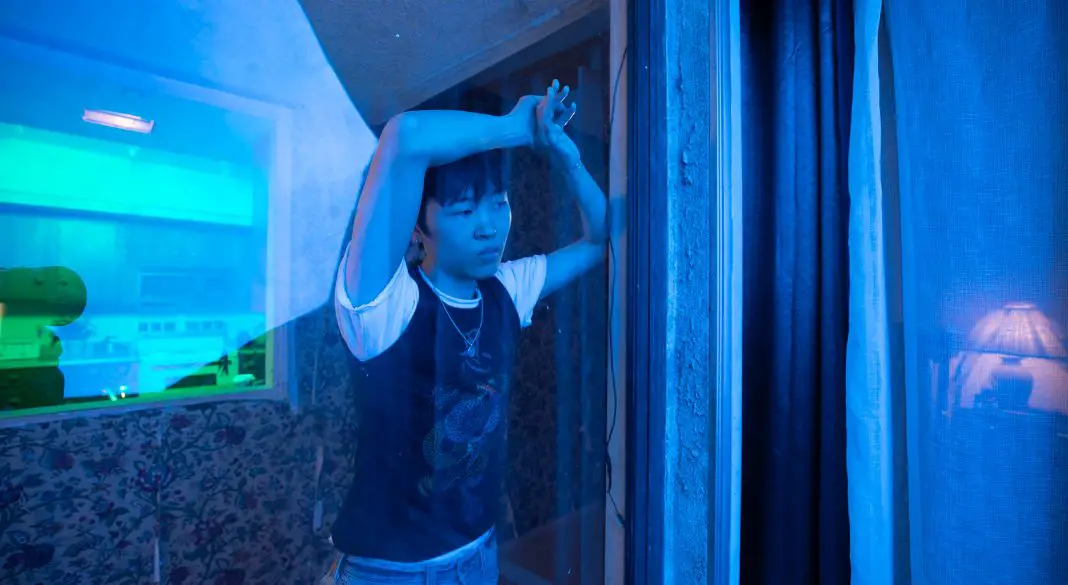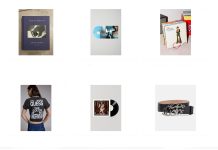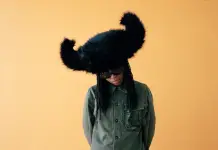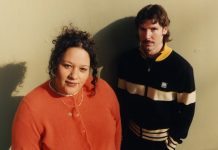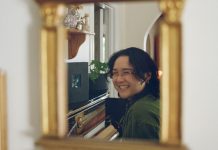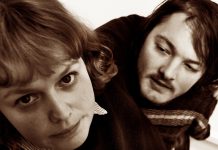Baek Hwong answers my Zoom call with his camera turned off. He has a warning for me.
“I’ve just got a very questionable haircut.”
There is some vague shuffling before he appears on screen, with said haircut obscured beneath a bandana and the hood of his Oodie. From what I can tell based on the few strands poking out, it can’t be all that bad.
Honesty has always been a gift for the singer and composer, better known by his stage name NoSo. In his last chat with The Forty-Five, Baek spoke candidly about growing up as the only Korean kid in a white Chicago suburb and coming out as trans in his early twenties. Baek continues to wear his heart on his sleeve for new album ‘When Are You Leaving?’ which turns his experience with existing outside of the gender binary into a musical autobiography.
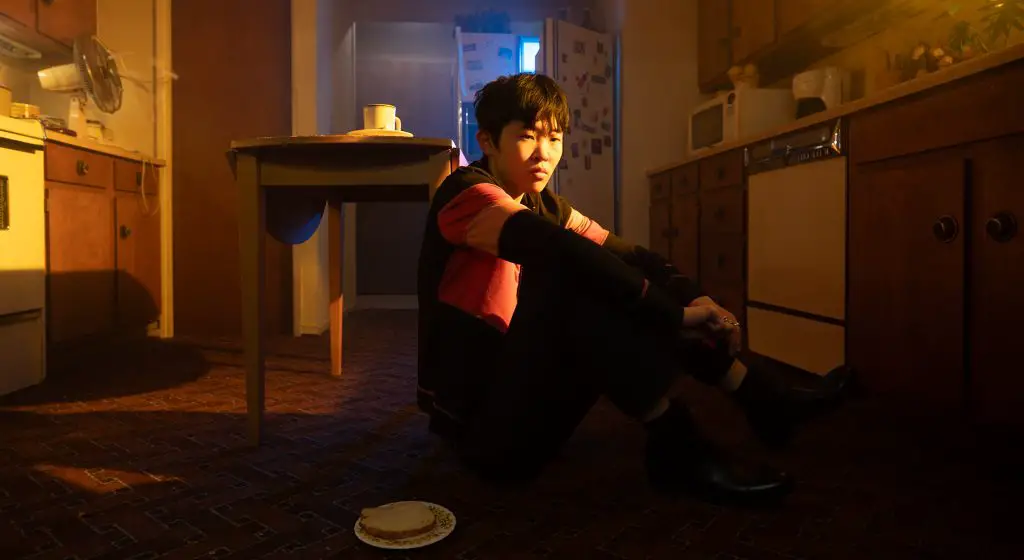
Congrats on the album! How are you feeling about its upcoming release?
I’m feeling good! I wrapped up the record back in September 2024, so I’ve been sitting on these songs for a minute. I’m excited for them to go out into the world.
What does the title ‘When Are You Leaving?’ mean to you, and how did it become the thread that pulled all the songs together?
I was looking up Korean idioms. That one came up and it struck a chord for me, because it encapsulated a lot of the themes across the songs. It’s something I ask myself a lot in different situations. It can be interpreted in a melancholy or bittersweet way, especially in these circumstances where I was dealing with my identity. My first record ‘Stay Proud Of Me’ was more fantasy, whereas this is a bit more like reality.
So your first record imagined what the future would be like for you. Would you say this album is more grounded in the present?
Yes. ‘Stay Proud Of Me’ was written during the peak of quarantine regulations, so I could really only look backward at experiences. It all heavily hinted at this future where I embrace my identity and what it could be like. ‘When Are You Leaving?’ is me actually experiencing it and in the thick of it.
You explore some very vulnerable aspects of your personal life within your lyrics. What inspired you to build the confidence to be open and honest about these?
It kind of trickled in. When I first started writing songs, I would use a lot of metaphors to hide what I was feeling, and then as I got older it started to feel more cathartic to be honest. For me, songwriting is a coping mechanism. There are so many times when I write about something subconsciously weighing on me without realising, and then when I look back on it, I realise what I’ve been trying to convey the entire time.
Not to be like an old man yelling at a cloud, but I feel like our generation gets so ashamed and embarrassed easily of putting ourselves out there. I don’t want to fall into that camp, I want to say things with my chest – even if it feels melodramatic looking back, because I know I felt that way at one point.
With less use of metaphors, how do you maintain the balance between poetic lyricism and honest biography?
There are certain lines that are very stark, which past me would have been too scared to release. My songs are different elements: one part is directly what happened, sometimes verbatim, another is how it made me feel, and the last section veers into surrealism about what I wish would have happened, or what I imagine an alternate universe could be like – I talk about that in my song ‘Nara.’ The blend of all those elements makes me feel more poetic than just being direct in every single line.
Your album spans a broad range genres: ‘80s synth pop, piano ballads, and even house inspiration. How do you approach such a wide palette without losing cohesion?
It’s always been in my nature when listening to records or making songs. I’ve never felt I wanted to stay in a certain box. The most exciting part about music is pushing myself – like on the piano ballad, ‘My Fault My Fault.’ I’m not a super confident pianist; people are surprised it’s me. I wrote it on an upright piano in one sitting. I’ve always loved choral music; I grew up singing in choirs and thought it was really beautiful. In a way, it feels like learning music for the first time. Things like that are always exciting to me. ‘A Believable Boy’ is also very different to what I’ve done before. I’ve always loved records like Rina Sawayama’s ‘Sawayama,’ where it goes from nu metal to pop ballads but still feels so cohesive.
The through line is embracing identity and walking away from tumultous situations. My mentality is that no matter how hard I push into a certain genre, it’s always going to sound like me. That in itself is inherently cohesive.
You said in your last interview with The Forty-Five that you take a lot of inspiration from film in your songwriting. Does that still resonate?
Yes, music and film go hand in hand. When making music, I always imagine two people from a movie in scenes together. I want listeners to imagine what’s going on in their own lives as a visual, too.
Going back to identity, what do you hope that listeners going through a similar exploration of their gender will take from your music?
I don’t see identity as a final form; it’s always a work in progress, and my music reflects that. I’ve always felt like my energy and who I am fluctuates; you can be tapped into femininity or masculinity depending on circumstances. I hope people who listen feel that way too: that there’s no pressure to have a final form, and the way you identify can change.
There’s a line in the album bio about “smaller, tangible victories.” Can you give me an example of what those look like for you?
Finding peace in walking away from things that were tumultuous and difficult, and being able to move past them, emotionally. To this day I’m always striving to feel peaceful, because I spent so much of my life feeling angry due to suppressing certain parts of who I am.
What helped you stop suppressing those parts of your identity?
My first record helped tremendously. When it came to sharing what the songs were about, I wanted to be honest, so that aided in the process significantly, which I didn’t expect; it unravelled naturally alongside the music.
Last time we spoke, you described the Chicago suburbs as “paradise and prison.” Do those early suburban memories still find their way into your songwriting, or have you put distance between yourself and that world?
I don’t remember saying that! My relationship to Chicago has changed. I went back last year for the first time in eight years on tour, and had such a beautiful experience. It was very different because I was in the city instead of the suburbs, which I never really got to experience before. I don’t really write about Chicago anymore because I don’t feel as melancholic about it. It doesn’t feel like home to me anymore; just a chunk of my life. Now it feels like LA is my home. I’m LA’s biggest fan. Maybe the songs are subconsciously about that, since it’s my reality.
How has the experience of living in LA shaped your songwriting?
I moved here with my family when I was in high school, and that’s what pushed me to start writing music. I would write silly joke songs before, but I didn’t feel like I had anything tangible to write about. I ended up going to the USC Thornton School of music, where I really formed as a musician. I was around the best musicians in the country, and I felt so inadequate. That put fuel under me. Watching my peers develop into artists was really inspiring.
Are you affected by comparing yourself to your peers?
I have always been able to keep my head down and avoid getting into those dark trenches. It’s not useful for anybody. Things can be a presentation; you never know what’s going on behind the scenes. I really try to feel zen and focus on what I’m doing.
That’s so inspiring. You collaborate with Jack Tatum and Bartees Strange on the new album. How did working with those artists influence your production process?
I’ve always been a fan of Jack Tatum’s work as Wild Nothing. I wrote ‘Sugar’ in a weird fever dream while I was super ill. He thought the melody was cool, so I went to Richmond, California to work with him. It was really inspiring to watch how he works; he’s a real purist to the ‘80s sound. I really love that song. The juxtaposition is funny; it sounds so fun, but it’s so challenging to play because of all the contrasting lines.
Bartees and I wrote ‘DAD MADE TOAST!’ the first time we properly met. I opened for him years ago, and always admired how he is genreless. We only had a few pieces of equipment, and the minimalism really allowed us to get creative. I always feel shy working with other people, but it just clicked.
Are there any hidden sonic details in the album that you hope listeners will pick up on?
In ‘A Believable Boy,’ when I say ‘Rewind,’ there’s a rewind sound from a guitar pedal.
What is the most difficult part of making an album?
I’m a prolific writer. I write a lot of songs, and they get dwindled down to the strongest ones. My barometer for that is, if I was listening to the song on a walk, would I find it interesting enough to stop in my tracks? Getting to that point can be really difficult. I also feel like, although music should be fun, making an album shouldn’t be the easiest thing in the world. There should be moments where you’re like, ‘Oh God, I know I can do better than this.’ It’s the most personal and intentional thing on Earth. You want to feel like you’re growing and trying different things. Inherently, making an album is hard – and it should be.
You played your biggest UK show to date at Gunnersbury Park this summer, with Khruangbin and TV On The Radio. What was it like playing to such a huge crowd?
That was a really fun day. I was honoured to see my name among that line-up; it was so surreal. I respect those musicians so much, they’re influences for me as well. I find the sheer volume of people a lot less scary than an intimate show – it’s weirdly soothing.
That’s interesting – what is it about an intimate show that you find more daunting?
When it’s thousands of people, it feels like you’re playing to a painting because your brain can’t comprehend that many people, but it feels so real when there are people right in front of you. If my family are in the crowd I feel like, ‘Oh god, I have to put on the best performance of my life.’ They’re so supportive and they’d be happy no matter what I do on stage, but my psyche reverts to being five years old at a recital.
What surprises can we expect from your upcoming headline tour?
I’ll probably – no, definitely – play ‘My Fault My Fault’. It’ll be a good challenge. A guitar is like another bone for me, so it’ll be fun and different to sit at a piano.
I always feel very rejuvenated when I do a show. Songwriting can feel so insular and bizarre when every day you’re wondering if other people have felt this way, but when seeing a demographic of people listening, I feel less alone. It makes me feel very understood. Everyone who goes to my shows is really respectful, to me and to each other. I feel really lucky; it’s wonderful to see.
Do you imagine how your songs will sound live when writing them?
On my last record I didn’t, because I hadn’t taken any of my own produced songs to a live arrangement yet. This time I had that experience, so it was definitely helpful to think that way.
What’s in store for the future of NoSo?
I’ve been thinking a lot about my third album, even more so from the perspective of the live element and what I find fun to play. Whenever I play my first record live, I get so excited to watch the crowd dancing. I’m interested in exploring what songs make other people dance. My dream has always been to compose for movies and shows. I also have some dream outdoor venues to play at: Red Rocks in Colorado and The Greek Theatre in LA. I love a visually stunning venue. I always want to shoot for the stars with music.


